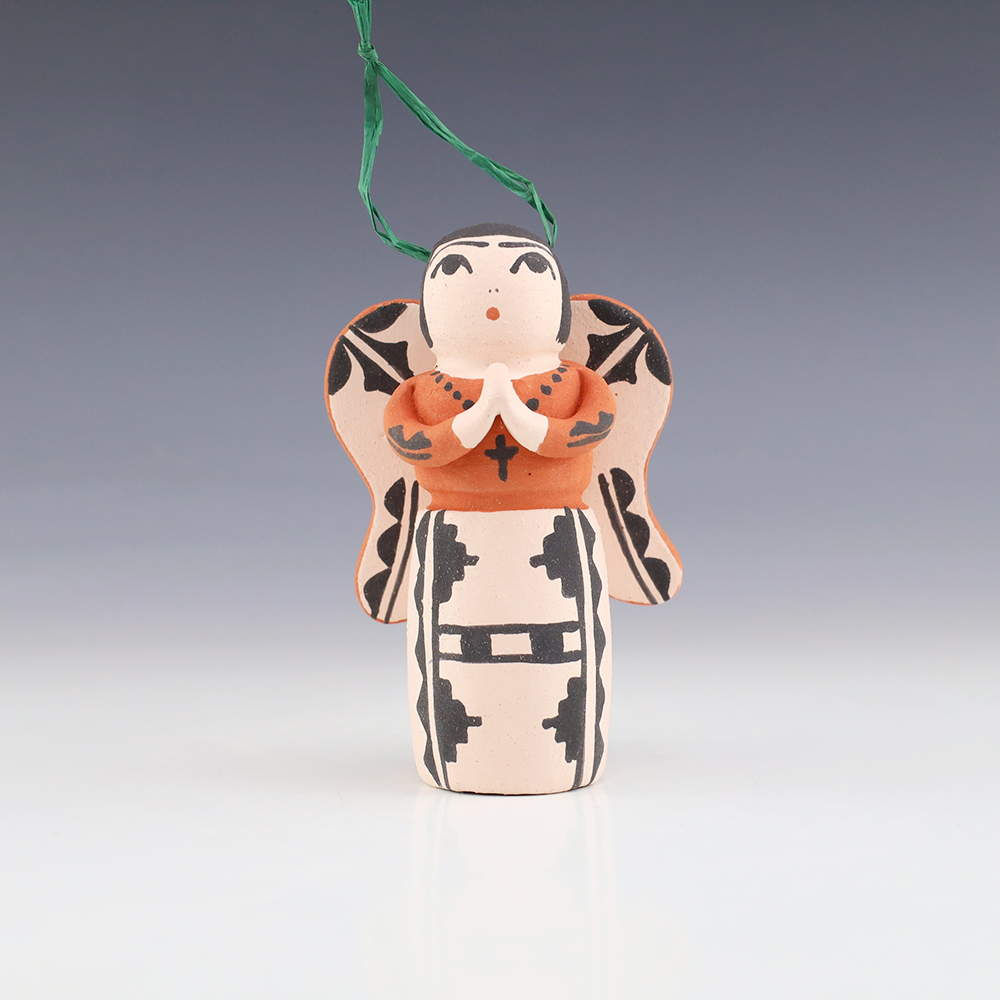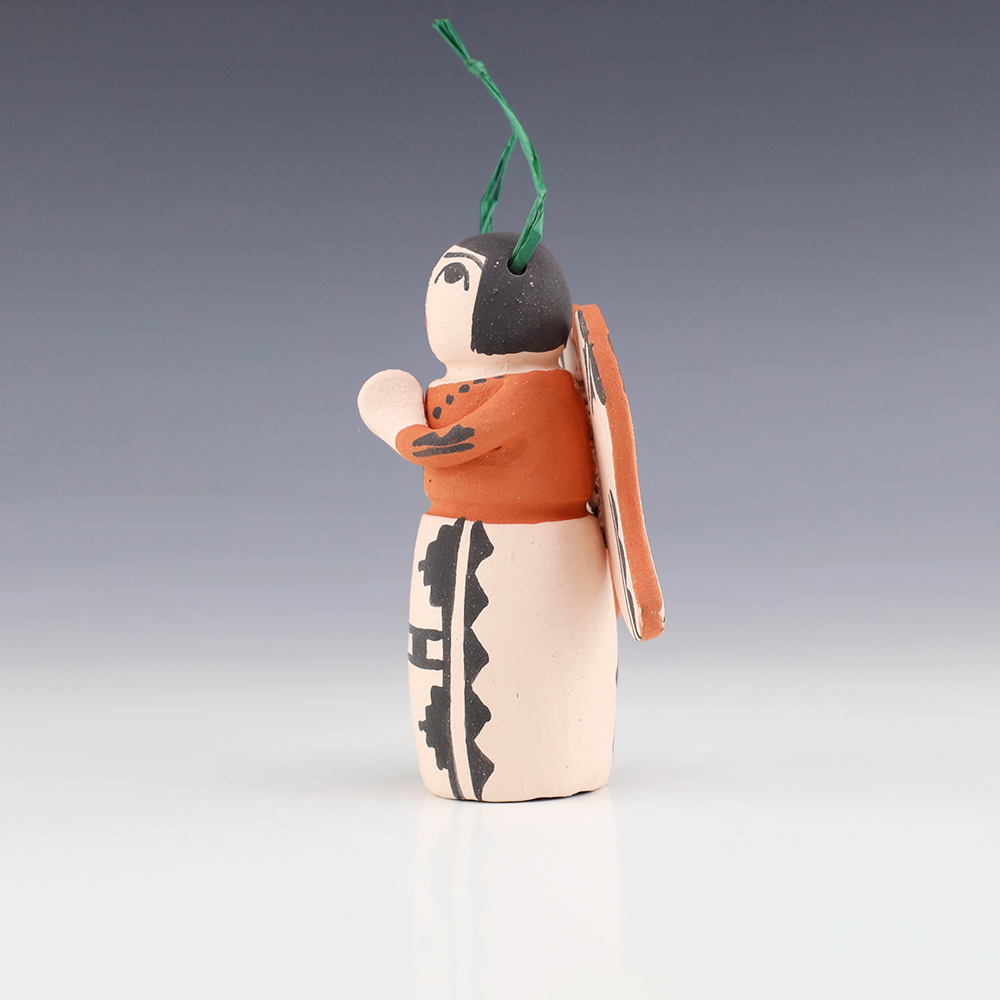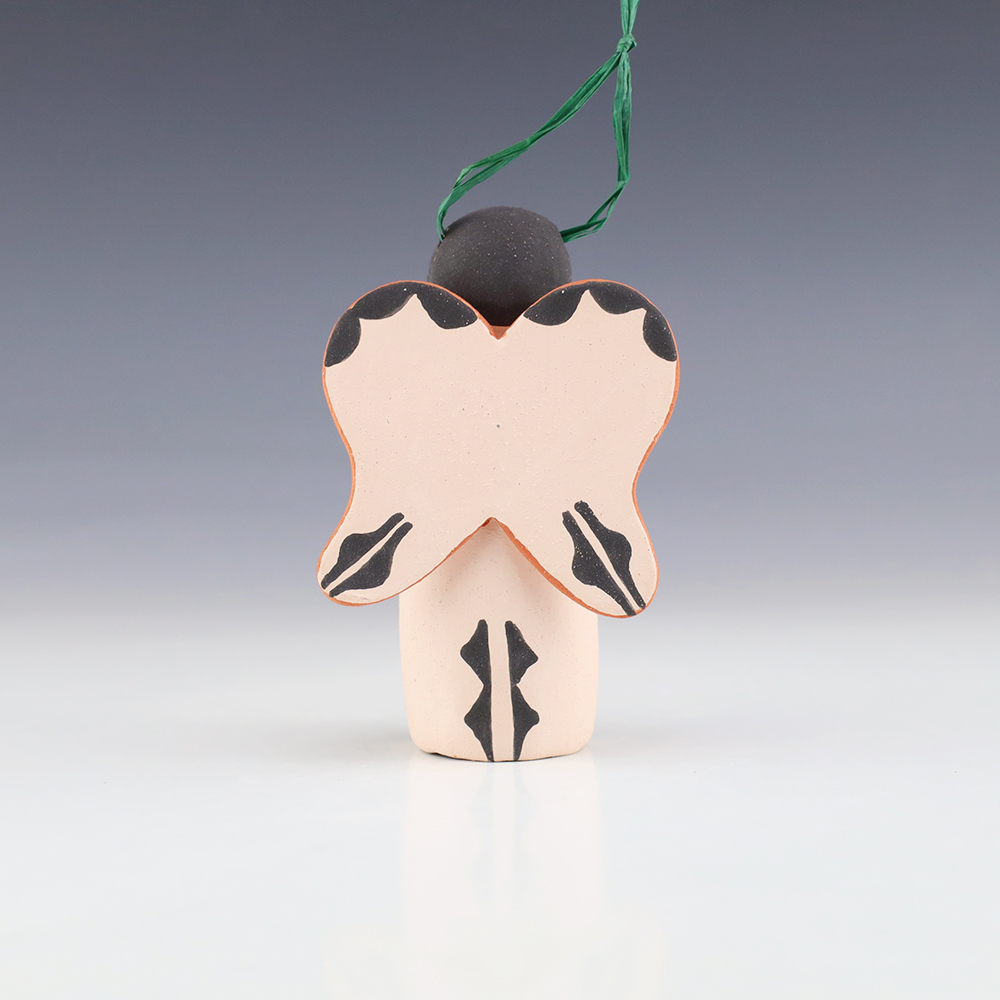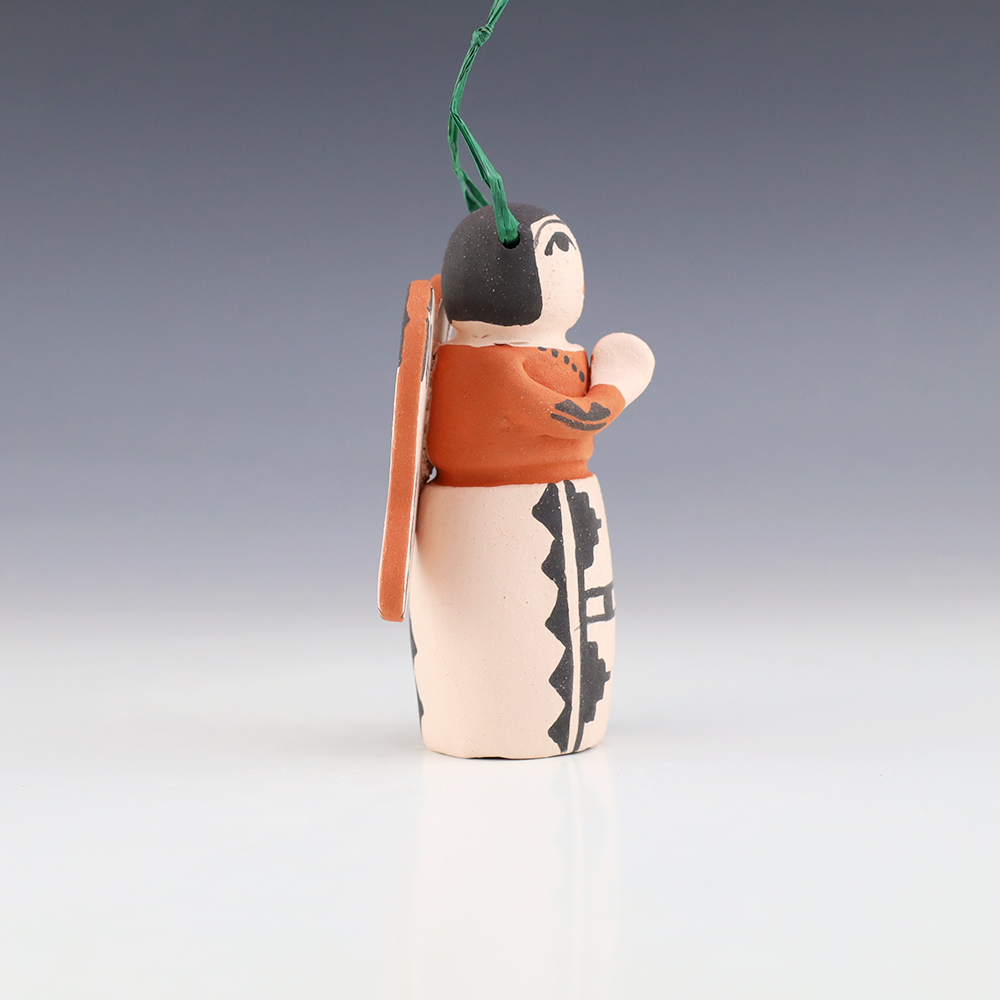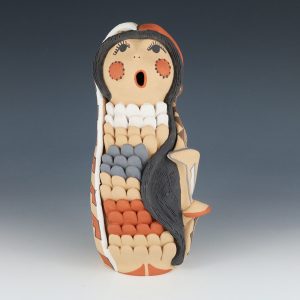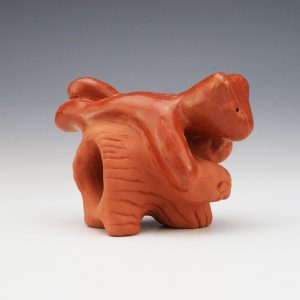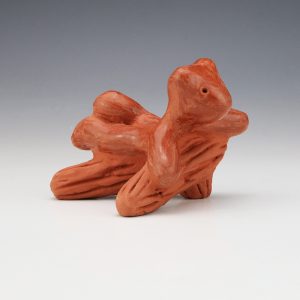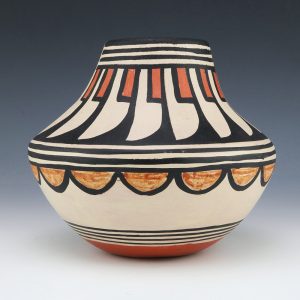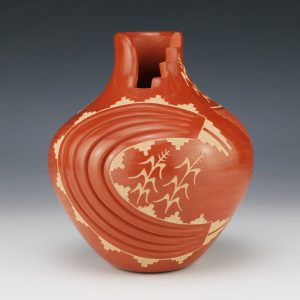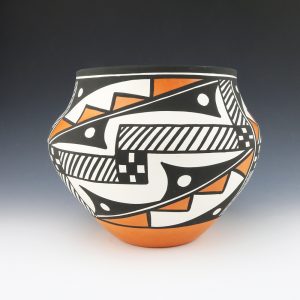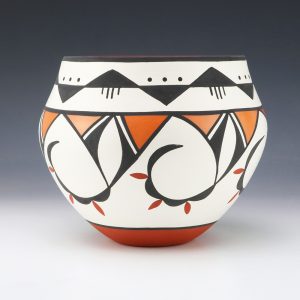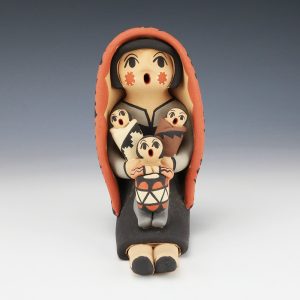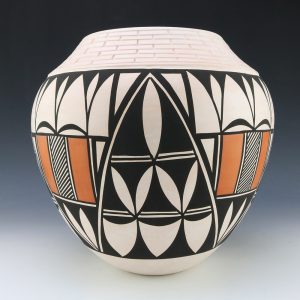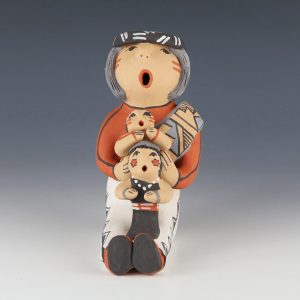Product Information
Product code: 2159 Categories: Other Folk Art, Pottery, Pueblo Pottery$30.00
-
1 in stock
Description
Kewa potters, Angel and Ralph Bailon made this delightful angel ornament. Traditionally made and fired using an outdoor kiln. Alluring colors and patterns. This pottery angel ornament would be a wonderful addition to your collection of Native American art or pottery.
2 3/4” tall x 2″ long x 1 3/8″ wide
Artist card included
The pottery is new but hand made and painted, so there may be imperfections. We try to capture every side in the photos but if you have any questions, please contact us.
Potters of the Kewa pueblo (Santo Domingo) have made traditional pots for centuries, developing styles for different purposes and expressing deep beliefs in their designs. Since the early decades of the 20th century, these pots have been appreciated by a wider audience outside the pueblos. Continuing to use traditional techniques, in the late 20th and early 21st centuries, potters have also expanded their designs and repertoire in pottery, which has an international market.
Additional information
| Weight | .5 lbs |
|---|
Returns and Exchanges
There are a few important things to keep in mind when returning a product you purchased.You can return unwanted items by post within 7 working days of receipt of your goods.- You have 14 calendar days to return an item from the date you received it.
- Only items that have been purchased directly from Us.
- Please ensure that the item you are returning is repackaged with all elements.
Ship your item back to Us
Firstly Print and return this Returns Form to: Po Box 33114 Santa Fe, NM 87594 Please remember to ensure that the item you are returning is repackaged with all elements. For more information, view our full Returns and Exchanges information.Related Products
JEMEZ POTTERY CORN MAIDEN BY EMILY FRAGUA TSOSIE
Jemez potter Emily Fragua Tsosie hand crafted this lovely pottery corn maiden. The Corn Maiden is an important figure in Pueblo culture, bringing a good harvest to feed the people. A unique addition to any pottery or Native American art collection. Signed 7 1/2” tall x 3 5/8″ long x...
SANTA CLARA POTTERY BEAR BY BIRDELL “VINE FLOWER” BOURDON
A charming addition to any art or pottery collection. Birdell “Vine Flower” Bourdon from the Santa Clara Pueblo, made this pottery bear with natural clay. Birdell continues a long tradition of hand coiling pottery. She was taught the traditional methods by her mother, Marie Sisneros Askan, and she has been...
POTTERY BEAR BY BIRDELL “VINE FLOWER” BOURDON SANTA CLARA
A charming addition to any art or pottery collection. Birdell “Vine Flower” Bourdon from the Santa Clara Pueblo, made this pottery bear with natural clay. Birdell continues a long tradition of hand coiling pottery. She was taught the traditional methods by her mother, Marie Sisneros Askan, and she has been...
NATIVE AMERICAN KEWA POTTERY VASE BY ROBERT TENORIO
Kewa potter Robert Tenorio is known for his polychrome pots created in the traditional Santo Domingo style, which typically features a red base and red interior and black designs painted on a buff background. This exquisite vase is created in this manner. Robert was born in 1950 into the Santo...
NATIVE AMERICAN JEMEZ POTTERY VASE BY ALVINA YEPA
This exquisite vase was handmade by Alvina Yepa from Jemez Pueblo. Alvina is of the Sun Clan and has been a potter since 1982. She was taught traditional pottery making by her mother, Felipita Yepa. Alvina is known for her stone polished redware jars, melon bowls and large incised ollas. ...
ACOMA POTTERY VASE BY LORETTA JOE NATIVE AMERICAN
Brilliantly constructed by hand from natural clay, this polychrome pot is covered in intricate designs. Acoma potter, Loretta Joe made this beautiful pot. A unique addition to any pottery or Native American art collection. Signed 6 1/2” tall x 8 1/8″ long x 8 1/8″ wide Artist card included Acoma...
OLLA BY DAVID ANTONIO ACOMA POTTERY
Brilliantly constructed by hand from natural clay, the pot is covered in intricate designs. Acoma potter, David Antonio created this lovely olla. David was born in 1961 to David Sr. and Hilda Antonio of the Acoma Pueblo. He was taught by his grandmother, Mary L. Antonio. A unique addition to...
NATIVE AMERICAN JEMEZ POTTERY STORYTELLER BY CHRISLYN FRAGUA
This wonderfully painted storyteller was handmade by Jemez Pueblo potter Chrislyn Fragua and depicts a woman with three children. Chrislyn uses both the coil method and pinch method to create her pottery piece and as in traditional storytellers, Chrislyn’s storytellers have their mouths open. Storytellers represent the passing down of...
ACOMA POTTERY OLLA BY EARLENE ANTONIO NATIVE AMERICAN
Brilliantly constructed by hand from natural clay, the pot is covered in intricate designs. Acoma potter, Earlene Antonio created this lovely olla. A unique addition to any pottery or Native American art collection. Signed 8 1/8” tall x 8 5/8″ long x 8 5/8″ wide Artist card included Acoma Pueblo...
JEMEZ POTTERY STORYTELLER BY EMILY FRAGUA TSOSIE
Jemez potter Emily Fragua Tsosie hand crafted this marvelous pottery storyteller, which depicts a man holding two children. Emily uses both the coil method and pinch method to create her pottery piece and as in traditional storytellers, Emily's storytellers have their mouths open. Storytellers represent the passing down of stories orally through Pueblo tradition. Signed
5” tall x 4 1/4″ long x 2 1/4″
Artist card included
Within the Jemez Pueblo there are many exceptional potters. The work is generally characterized by the buff and red clays used, and the range of styles and subjects. Storyteller, figures, sgrafitto designs, wedding vases, and melon pots are a few of their favorites. Before the arrival of the Spanish, Jemez was known for its traditional black-on-white ware, but production of this type of pottery died out in the early 18th century. There was a revival of Jemez pottery-making in the early 20th century inspired and influenced by Zia pottery designs, but it was not until the 1960’s and 70’s that a significant number of Jemez potters began producing high-quality work using traditional methods.

